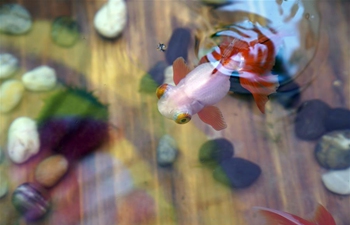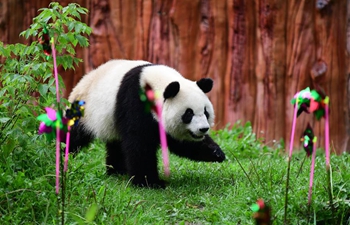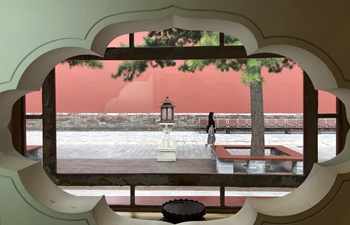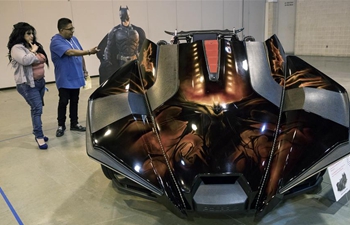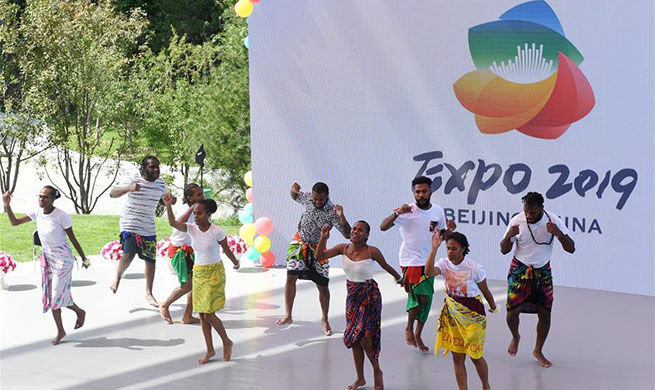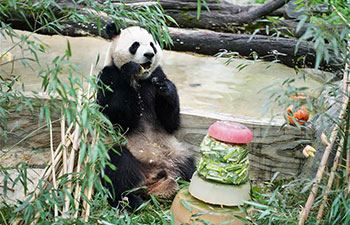BEIJING, July 30 (Xinhua) -- Hundreds of years after his creation, the most rebellious teenager in Chinese mythology finally reconciled with his family, winning applause and tears from modern Chinese moviegoers.
Ne Zha, a Chinese mythical figure known for his rebellious spirit, is experiencing a huge boost of popularity following the runaway success of an animated movie featuring him as the main character.
Home-grown animation "Ne Zha" on Tuesday emerged as the highest-grossing domestically made animated film on the Chinese mainland.
As the first Chinese IMAX animated film, "Ne Zha" had raked in more than 1 billion yuan (about 145 million U.S. dollars) as of Tuesday evening, the fifth day of its release, according to the China Movie Data Information Network.
It beat the "Monkey King: Hero is Back" with about 956 million yuan and is on course to beat out the animated Disney film "Zootopia," the top-grossing animation in the mainland market with 1.53 billion yuan.
The film tells a story of Ne Zha, who was a devil born into a loving family and eventually emerged as a hero. The mythical figure riding on his "wind fire wheels" appears in some of the country's best-known works of classic literature, such as "Journey to the West."
Maoyan, a film database and ticketing platform, forecasted that the film's total box office in the Chinese mainland will surpass 3 billion yuan.
It has also become one of the highest-rated Chinese animation films in recent decades, scoring 8.7 out of 10 on China's leading film rating platform Douban, and 9.7 out of 10 on Maoyan.
"'Ne Zha' is a top-quality Chinese home-grown animation in recent years, thanks to its mature screenwriting, amazing visual effect as well as a unique style of entertainment," said Movie critic Zhang Shufan.
BREAKING STEREOTYPES
Its resounding success was a stark contrast to the cold shoulder it received after the release of its first two trailers, which raised questions and mockery for its presentation of "the ugliest version of Ne Zha."
"The audience may think he is ugly at first, but after watching the movie, they will love him because of his soul and spirit," said the film's director Yang Yu, explaining that they deliberately picked an ugly version.
Yang, who also goes by the name Jiaozi, said the film is about fighting social stereotypes and so-called destiny. The film's protagonist, while aspiring to become a hero, has to fight the widespread belief that he, as a demon reincarnation, is destined to wreak havoc.
"In reality, many young people are breaking down outside limits and prejudices," he said, adding that the movie's themes appear to be clicking with young Chinese.
This is not the first movie to have Ne Zha as the protagonist. In 1979, a milestone animation "Prince Nezha's Triumph Against Dragon King" was produced, becoming a childhood memory of many Chinese.
"Although Ne Zha is a mythical figure, he should carry different spiritual cores in different ages," Jiaozi said. "Humans are complex. You cannot judge a person with prejudice."
Many viewers are also surprised by Ne Zha's intimacy with his parents in the film, a clear deviation from some previous versions in which Ne Zha had tense relations with his father and his suicide is interpreted as a revolt against ancient China's feudal family system.
In contrast, Jiaozi's version, by redirecting Ne Zha's rebellion toward social bias, is seen as resonating more with the modern parent-child relationship in China.
"Ne Zha's parents are very typical Chinese parents, who express their love toward their children through action but seldom by words," said Tang Shiyuan, a university student.
HERO IS BACK
According to a report by the China Film Association, the Chinese animation film sector entered a "relative trough" in recent years, when few films emerged to challenge the 2015 box office smash "Monkey King: Hero is Back."
Many moviegoers now regard "Ne Zha" as the successor of the Monkey King film for once again bolstering confidence in and expectations for China-made animation features.
"Despite some shortcomings, 'Ne Zha' has rekindled public expectations by innovatively integrating contemporary elements with a traditional story," said Shi Chuan, professor at Shanghai Theatre Academy and deputy head of the Shanghai Film Association.
The film also hints at creating a Marvel Universe-like ecosystem of Chinese legendary figures, with bonus scenes suggesting that a Ne Zha sequel and one on Jiang Ziya, another mythical hero sharing the same timeline of Ne Zha, are in the making.
Wang Lei, a producer of several Chinese animations, said the successes of the Monkey King and Ne Zha films have inspired the Chinese movie industry to make full use of ancient Chinese myths and folklore.
"We can see that the whole industry is striving to make internationally first-class animations, though it will still take some time to establish our own set of animation series and brands," said Shi.




